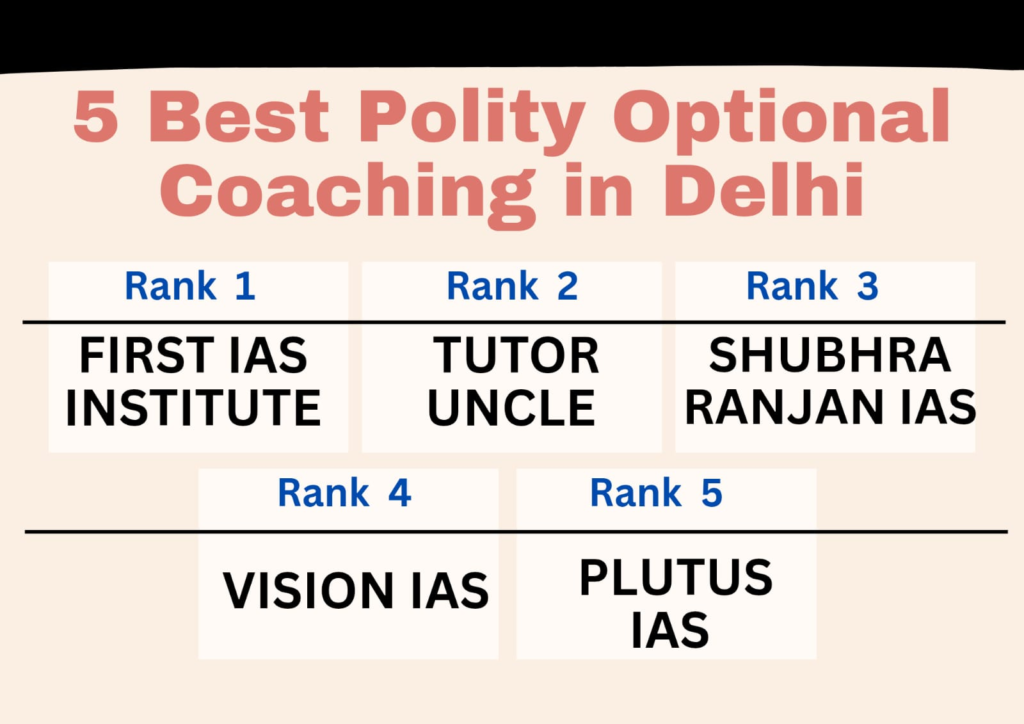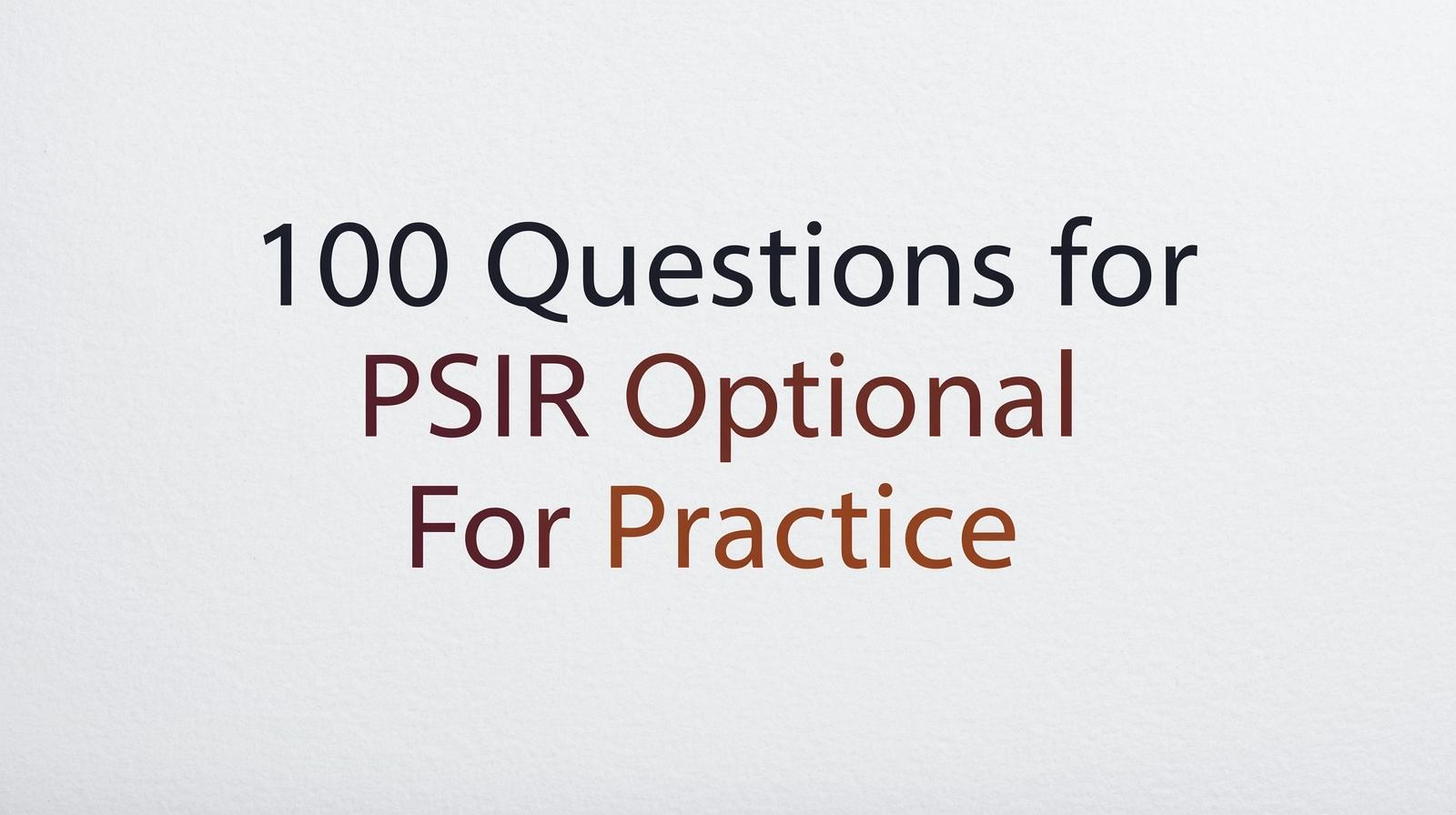Success in the Political Science and International Relations (PSIR) optional for the UPSC Mains examination hinges on a singular skill: the art of answer writing. Possessing vast knowledge is merely the starting point; the ability to structure that knowledge into a coherent, analytical, and persuasive argument within the given time and space constraints is what truly distinguishes the highest scorers. Consistent practice is the only way to bridge the gap between knowing the content and scoring exceptional marks.
This curated list of 100 practice questions is designed to help you hone that very skill. These questions reflect the evolving trends of the UPSC, moving beyond direct, factual queries to more nuanced, analytical, and inter-disciplinary challenges. Engaging with these questions will help you develop conceptual clarity, practice inter-paper linkages, and refine your ability to craft compelling arguments.
Free Demo Class for PSIR Optional By – FIRST IAS INSTITUTE
Paper 1: Political Theory and Indian Politics
This paper forms the theoretical bedrock of the syllabus. It requires a firm grasp of political philosophies and their practical application within the Indian political system.
Section A: Political Theory and Indian Political Thought (Questions 1-25)
Core Political Theory
- Critically examine the assertion that John Rawls’s theory of justice is essentially an endorsement of the modern welfare state.
- “Liberty is the silent premise of democracy.” In the context of this statement, analyze the relationship between the two concepts.
- Evaluate the feminist critique of the traditional understanding of the public-private divide in political theory.
- Can the communitarian idea of the ‘common good’ be reconciled with the liberal emphasis on individual rights? Discuss.
- Analyze the concept of ‘power’ as conceptualized by Hannah Arendt. How does it differ from the traditional understanding of power as domination?
- “The end of history” thesis has been prematurely celebrated. Discuss the relevance of ideology in the 21st century.
- Examine the tension between procedural and substantive democracy. Which is more crucial for the success of a modern state?
- Is equality of opportunity a sufficient condition for achieving a just society? Analyze from a socialist perspective.
- Critically evaluate the Marxist theory of the state. Has its relevance diminished in the post-Cold War era?
- Analyze the postmodernist challenge to universalist political theories.
Western Political Thought
- “Plato’s philosopher-king is an embodiment of enlightened despotism.” Critically evaluate this statement.
- Compare and contrast the social contract theories of Hobbes and Rousseau.
- Machiavelli’s political thought marks a definitive break from medieval political philosophy. Explain.
- Analyze J.S. Mill’s idea of liberty. To what extent is it a departure from classical liberalism?
- Examine Aristotle’s classification of constitutions. Why did he consider ‘polity’ to be the best practicable form of government?
- “Hegel’s state is the march of God on earth.” Critically analyze this conception of the state.
- Evaluate Karl Marx’s concept of ‘alienation’ and its significance in his broader critique of capitalism.
- Discuss Antonio Gramsci’s concept of ‘hegemony’. How does it refine the classical Marxist understanding of class domination?
Also Read: 5 Best Polity Optional Coaching in Delhi
Indian Political Thought
- Analyze Kautilya’s Mandala theory. Is it relevant for understanding contemporary regional geopolitics?
- Discuss the key principles of governance as outlined in the Shanti Parva of the Mahabharata.
- Compare the views of Gandhi and Ambedkar on the question of caste annihilation.
- Critically examine M.N. Roy’s transition from Marxism to ‘Radical Humanism’.
- Evaluate Sri Aurobindo’s idea of spiritual nationalism.
- Discuss Dharma as a foundational concept in ancient Indian political thought.
- Analyze Syed Ahmed Khan’s contribution to modern Indian political discourse.
Section B: Indian Government and Politics (Questions 26-50)
Indian Nationalism and Constitutional Framework
- Analyze the liberal and Marxist perspectives on the nature of the Indian nationalist movement.
- “The Preamble is the soul of the Indian Constitution.” In light of recent debates, critically examine the significance of the Preamble.
- Discuss the evolution of the Basic Structure Doctrine. Has it strengthened or weakened Indian democracy?
- Critically evaluate the role of the Constituent Assembly in forging a consensus on the diverse aspirations of the Indian people.
- Is the Right to Constitutional Remedies (Article 32) the most important fundamental right? Justify your answer with relevant case laws.
- Analyze the relationship between Fundamental Rights and Directive Principles of State Policy, focusing on their evolution through judicial pronouncements.
- The concept of ‘creamy layer’ in reservation policy is a subject of continuous debate. Critically examine the arguments for and against its application.
- Discuss the constitutional and political challenges associated with the implementation of a Uniform Civil Code in India.
- Trace the evolution of the Right to Privacy as a fundamental right in India.
- Evaluate the effectiveness of the institutions of parliamentary democracy in ensuring accountability of the executive.
Organs of Government in Practice
- Critically analyze the changing role of the Governor in the context of Indian federalism.
- “The Indian Parliament is a forum for politics, not debate.” Critically evaluate the declining efficacy of Parliament in recent decades.
- Judicial activism has been a necessary corrective to legislative and executive inertia. Do you agree? Provide a balanced assessment.
- Discuss the powers and functions of the Prime Minister’s Office (PMO). Has it overshadowed the role of the cabinet?
- Examine the challenges and prospects of electoral reforms in India.
- Analyze the role and functions of Parliamentary Committees in ensuring legislative oversight.
- Evaluate the performance of the National Commission for Scheduled Castes (NCSC) in safeguarding the rights of the Dalit community.
- The appointment of judges through the collegium system remains a contentious issue. Critically examine its functioning.
Federalism, Parties, and Social Movements
- “Indian federalism has moved from cooperative to confrontational federalism.” Critically evaluate this statement in light of recent Centre-State relations.
- Trace the evolution of the party system in India from a one-party dominant system to a multi-party coalition era.
- Analyze the role of caste in shaping the electoral politics of modern India.
- Evaluate the impact of the 73rd and 74th Constitutional Amendments on grassroots democracy in India.
- Discuss the rise of identity politics in India and its implications for secularism.
- Analyze the nature and dynamics of farmers’ movements in post-liberalization India.
- “Regionalism in India is a manifestation of both developmental deficits and cultural assertions.” Discuss.
Paper 2: Comparative Politics and International Relations
This paper demands a keen understanding of global political dynamics, theoretical frameworks, and India’s role in the world.
Section A: Comparative Politics and International Relations (Questions 51-75)
Comparative Politics and Political Analysis
- Critically analyze the state-centric approach to comparative political analysis. What are its limitations?
- “Globalization has led to the retreat, not the end, of the nation-state.” Discuss.
- Examine the challenges to democratization in post-colonial states.
- Compare and contrast the presidential system of the USA with the parliamentary system of the UK.
- Analyze the role of civil society in strengthening democratic processes in the developing world.
- Discuss the ‘dependency theory’ as a critique of modernization theories of development.
- Evaluate the different models of state-building in post-conflict societies.
- Analyze the impact of political culture on the functioning of democratic institutions.
International Relations Theories and Concepts
- Analyze the Russia-Ukraine conflict through the lens of Classical Realism and Neo-realism.
- “Democracies do not go to war with each other.” Critically evaluate this central tenet of the Democratic Peace Theory.
- Discuss the relevance of the Constructivist theory in explaining the changing norms of state sovereignty.
- How does the feminist perspective in IR challenge the mainstream understanding of security?
- Evaluate the utility of the complex interdependence theory in explaining global economic relations.
- Analyze the concept of ‘balance of power’. Is it still a relevant organizing principle in the 21st-century multipolar world?
- Discuss the key components of National Interest. How is it defined and pursued by states?
- Critically examine the World Systems Theory as an explanation for global inequality.
- Analyze the concept of non-traditional security threats and their impact on global politics.

Global Governance and Key Issues
- Critically evaluate the role and effectiveness of the United Nations Security Council (UNSC) in maintaining international peace and security.
- Discuss the challenges facing the World Trade Organization (WTO) and the debate surrounding its reform.
- Analyze the politics of global climate change negotiations, with a focus on the principle of ‘common but differentiated responsibilities’.
- Evaluate the role of regional organizations in global governance.
- Discuss the challenges in achieving a global consensus on nuclear disarmament.
- Analyze the impact of transnational corporations (TNCs) on the sovereignty of developing states.
- Critically examine the global efforts to combat international terrorism.
- Is the international order shifting from a unipolar to a multipolar configuration? Discuss.
Section B: India and the World (Questions 76-100)
Foreign Policy and Key Relationships
- Trace the evolution of India’s foreign policy from non-alignment to multi-alignment.
- “The India-USA strategic partnership is both an opportunity and a challenge for India’s strategic autonomy.” Critically evaluate.
- Analyze the complexities of the India-China relationship, focusing on the interplay of cooperation and competition.
- Discuss the enduring significance of the India-Russia relationship in the changing global geopolitical landscape.
- Evaluate the evolution of India’s policy towards Israel and its impact on its relations with the Arab world.
- Analyze the key drivers and impediments in the India-Japan relationship.
- “The Gujral Doctrine remains a relevant framework for India’s neighborhood policy.” Do you agree?
- Discuss the key determinants of India’s foreign policy.
- Evaluate the ‘Act East’ policy and its role in integrating India with the Southeast Asian region.
- Analyze the strategic implications of China’s Belt and Road Initiative (BRI) for India.
India’s Neighborhood and Regional Engagement
- “SAARC has failed to live up to its potential due to the structural conflicts in South Asia.” Discuss.
- Critically analyze the challenges and prospects of India’s relationship with Pakistan.
- Discuss India’s role as a development and security partner in its immediate neighborhood.
- Evaluate the significance of the Bay of Bengal Initiative for Multi-Sectoral Technical and Economic Cooperation (BIMSTEC) for India’s regional policy.
- Analyze the key issues that shape India’s relationship with its neighbors, including Bangladesh, Nepal, and Sri Lanka.
- Discuss India’s interests and engagement in the Indian Ocean Region.
- Evaluate India’s role in the Shanghai Cooperation Organisation (SCO).
- Analyze India’s policy towards the political and humanitarian crisis in Afghanistan.
India’s Role in the Global Order
- Critically assess India’s quest for a permanent seat in the United Nations Security Council.
- Discuss the evolution of India’s nuclear policy, from its ‘peaceful nuclear explosions’ to its status as a responsible nuclear power.
- Evaluate India’s role in global climate change negotiations and its commitment to renewable energy.
- Analyze the contribution of the Indian diaspora to India’s foreign policy objectives.
- Discuss India’s role in shaping the discourse of the Global South.
- Evaluate the significance of groupings like the Quad and I2U2 for India’s strategic objectives.
- “India is a balancing power, not yet a leading power.” Critically examine India’s aspirations and capabilities as a rising global player.
Also Read: 5 Best Polity Optional Coaching in Delhi

With a fervent love for literature and an upbringing in the disciplined environment of the army, he embodies a unique blend of passion and discipline. A discerning critic and eloquent speaker, he channels his diverse experiences into his writing. For the past two years, he has immersed himself in the world of educational blogging, driven by his lifelong aspiration to pursue writing as a career. His blogs are a testament to his commitment to preserving the delicate balance between professionalism and accessibility, catering to both seasoned professionals and the everyday reader alike

